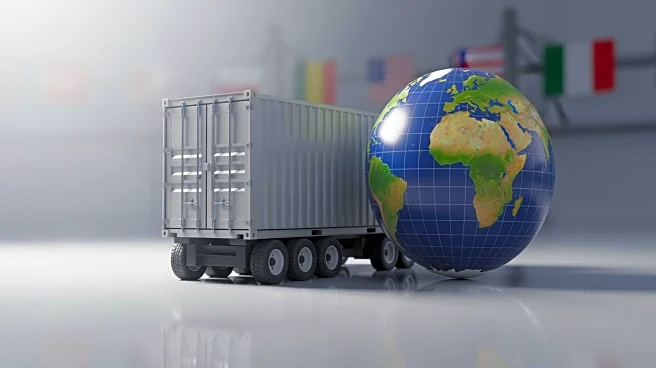What's Happening?
Hub Group, Inc., a leading provider of intermodal and trucking logistics solutions based in Tampa, Florida, has announced a strategic joint venture with EASO, a premier intermodal provider in Mexico. This collaboration aims to enhance Hub Group's cross-border
services, expanding its capabilities and scale for customers. With over 50 years of expertise in the transportation industry, Hub Group offers a comprehensive suite of services, including truck brokerage, asset-based trucking, and temperature-controlled logistics. The company is focused on innovation and efficiency, leveraging advanced technology and a robust network to deliver reliable, cost-effective transportation solutions across North America.
Why It's Important?
The joint venture between Hub Group and EASO is significant as it strengthens Hub Group's position in the logistics industry, particularly in cross-border transportation services. This expansion is crucial for sectors such as retail, healthcare, and automotive, which rely heavily on efficient and reliable logistics solutions. By enhancing its capabilities, Hub Group can better serve its clients, potentially leading to increased market share and competitiveness. The move also reflects the growing importance of cross-border logistics in the global supply chain, highlighting the need for companies to adapt and innovate to meet evolving demands.
What's Next?
As Hub Group continues to expand its services through strategic partnerships, it is likely to focus on further enhancing its technology-driven solutions to improve efficiency and customer satisfaction. The company may also explore additional partnerships or acquisitions to strengthen its network and capabilities. Stakeholders, including customers and industry partners, will be closely monitoring the impact of this joint venture on service delivery and operational efficiency.
Beyond the Headlines
The expansion of Hub Group's cross-border services through its joint venture with EASO may have broader implications for the logistics industry, particularly in terms of regulatory compliance and trade policies. As cross-border logistics become more integral to supply chains, companies may face increased scrutiny regarding environmental impact and labor practices. This development could also influence cultural and economic exchanges between the U.S. and Mexico, fostering greater collaboration and understanding.

















